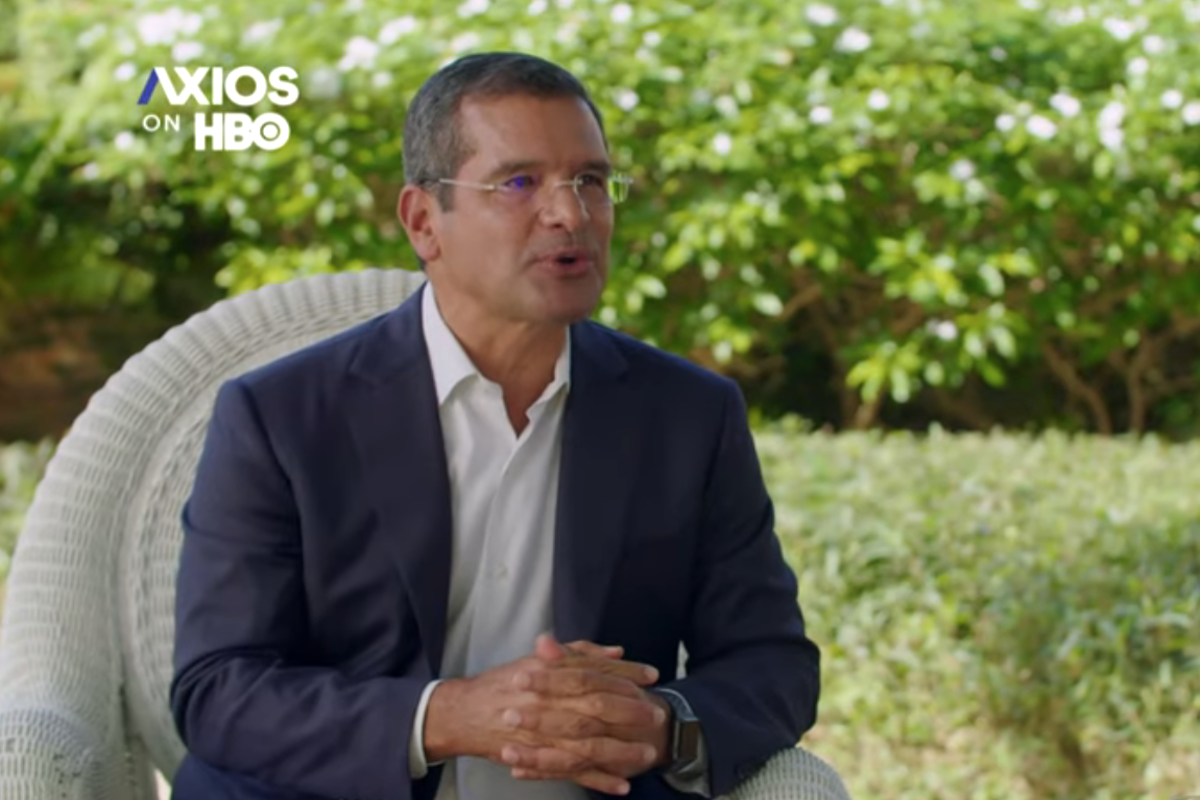

Puerto Rico governor Pedro Pierluisi during his February 14, 2021 interview with Axios on HBO (Screen grab)
Saying that he anticipates “considerable support” in Congress for Puerto Rico to become a state, governor Pedro Pierluisi said that statehood bills will be introduced in the House of Representatives no later than the middle of March.
“I believe you will see bills being introduced in the House at the latest by mid-March of this year, so within a month,” Pierluisi told Axios’ Alexi McCammond during an Axios on HBO interview that first aired on Sunday.
When McCammond asked the pro-statehood Democrat how he knows that, Pierluisi said that he has spoken with House members. He mentioned two names—Rep. Darren Soto (D-FL) and Puerto Rico’s Jenniffer González, a pro-statehood Republican who is the island’s Resident Commissioner and a non-voting member of Congress. (Soto is also of Puerto Rican descent.) In 2019, Soto and González were part of a bipartisan statehood bill that went nowhere legislatively. After that bill failed, Soto sought to seek other alternatives regarding the status question.
In the Axios on HBO interview, Pierluisi also said he has also “gotten calls from members of the Senate inquiring about this issue and exploring it,” noting that Senator Martin Heinrich (D-NM) called the Puerto Rico governor just last week. In 2014, Heinrich submitted a statehood bill in the Senate the same time that Pierluisi, who was Puerto Rico’s Resident Commissioner back then, submitted a similar bill in the House. Those bills also went nowhere legislatively.
Right before Pierluisi shared the news about the statehood bill with Axios on HBO, McCammond asked him about Rep. Alexandria Ocasio-Cortez (D-NY) and the Puerto Rico Self-Determination Act that she is co-sponsoring with Rep. Nydia Velázquez (D-NY). Both Ocasio-Cortez and Velázquez are of Puerto Rican descent.
That bill, if passed, would “prompt Puerto Rico’s Legislature to create a Status Convention whose delegates would be elected by Puerto Rican voters. This body would develop a long-term solution for Puerto Rico’s status, be that statehood, independence, free association or any option other than the current territorial arrangement,” Ocasio-Cortez and Velázquez wrote last year. A new version of the self-determination bill is expected to be reintroduced by the end of February.
“I would love to have [Ocasio-Cortez’s] support. I don’t rule out convincing her to join me in the way that I’m approaching this,” Pierluisi said, noting that he is pushing a statehood bill.
The governor insisted that if Puerto Rico were to become a state, it would be a swing state like Florida, guaranteeing that the Puerto Rican delegation of Senators and members of the House would be a mix of Democrats and Republicans.
.@GovPierluisi says that #PuertoRico, if it were to become a state, would be a swing state like Florida.
"This would be a truly completely Hispanic state," he tells @axios.
— Julio Ricardo Varela (@julito77) February 14, 2021
News of a possible new legislative push for statehood comes months after the results of a non-binding 2020 status plebiscite gave statehood a 52%-48% win. During that same election cycle, Pierluisi was elected governor of Puerto Rico with just 33% of the vote.
In the non-binding plebiscite of 2012, Puerto Ricans rejected the island’s current Commonwealth status and chose statehood. In a 2017 non-binding plebiscite, 97% of voters chose statehood, although the total vote was the lowest vote for statehood since 1967. Both the 2012 and 2017 plebiscites were boycotted by non-statehood advocates, although the 2020 vote was not. All three non-binding plebiscites have been criticized as being political tools of the island’s pro-statehood party.
In another part of the Axios on HBO interview, Pierliusi was asked about Donald Trump and the former President’s words and actions towards Puerto Rico. At one point in this answer, Pierluisi acknowledged that the island suffered thousands of deaths from Hurricane María—an issue that former governor Ricardo Rosselló did now want to acknowledge for months. A prominent pro-statehood advocate who once headed up the pro-statehood party that Pierluisi now leads, Rosselló resigned from office in 2019 after massive mobilizations against his administration. Pierliusi was sworn in a Rosselló’s successor, but his appointment was ruled unconstitutional. Wanda Vázquez then became governor of Puerto Rico, only to lose to Pierliusi in the statehood party’s gubernatorial primary in 2020. Pierluisi went on to barely win the general election for governor.
“The U.S. could be expanding by admitting Puerto Rico into the union. It would be telling the world that it is embracing diversity because this would be a truly, completely Hispanic state,” Pierluisi said.
***
Julio Ricardo Varela is founder and publisher of Latino Rebels, part of Futuro Media. He tweets from @julito77.



this should be voted on by the American people.
[…] Sunday, Puerto Rico governor and pro-statehood advocate Pedro Pierluisi announced that statehood bills would be presented in Congress by the middle of March, explaining that he […]